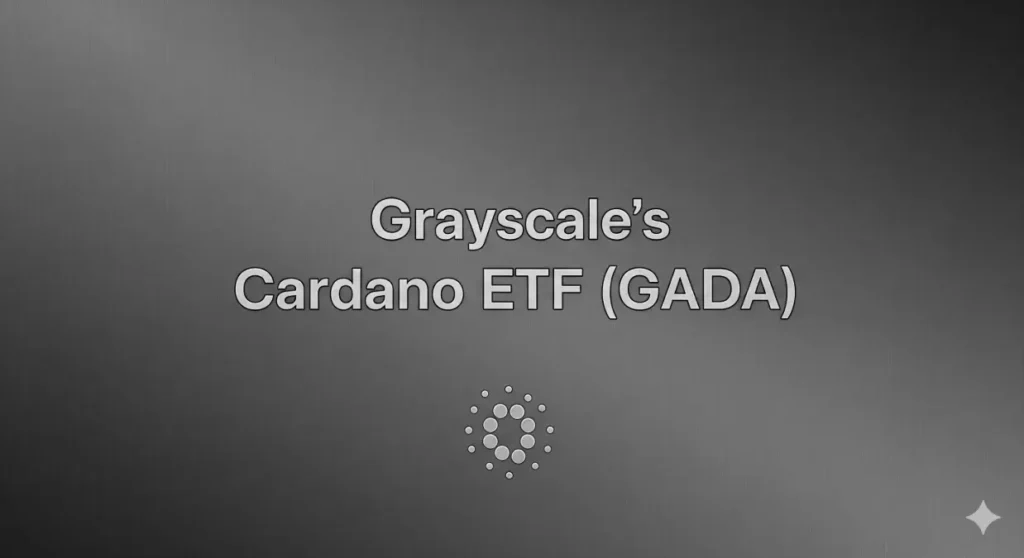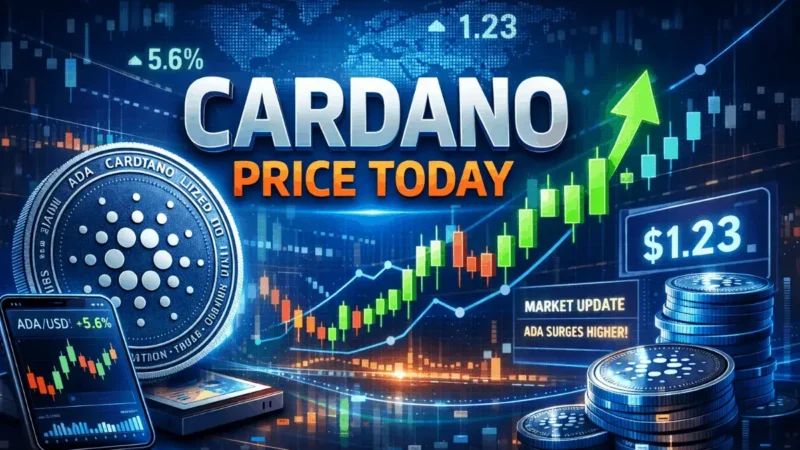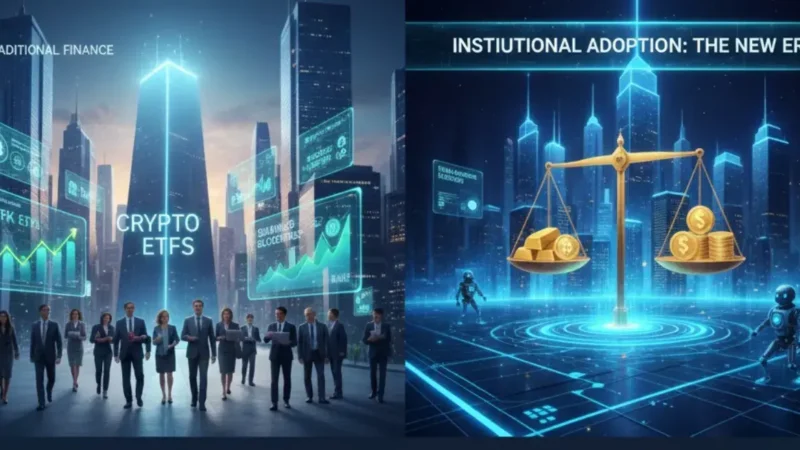Grayscale’s GADA: The Cardano ETF Poised to Reshape Digital Asset Investment

The landscape of cryptocurrency investment is in the midst of a profound transformation, moving from the fringe of speculative digital assets to the mainstream of regulated financial products. Following the landmark approvals of spot Bitcoin and Ethereum ETFs, the market’s attention has now shifted to the next frontier: a Cardano ETF. In a move that signals growing institutional confidence in alternative layer-1 blockchains, Grayscale, a pioneer in digital asset management, has filed an amended S-1 with the SEC for a Cardano ETF (GADA). This development is not just another filing; it’s a pivotal moment for the Cardano ecosystem and a potential catalyst for a new wave of capital inflow into the market.
This filing, which includes a custody partnership with Coinbase and a groundbreaking staking feature, has sent a clear message to the market. Prediction markets and analysts have responded with a surge in approval odds, now sitting at a formidable 87%, with a final SEC decision expected by October 26, 2025. This high probability reflects a maturing regulatory environment and a growing understanding among regulators of the stability and legitimacy of leading crypto assets.
The Mechanics of an ETF: Unlocking Institutional Capital
To understand the significance of a Cardano ETF, one must first grasp the role of Exchange-Traded Funds in traditional finance. An ETF is an investment vehicle that holds a collection of assets—in this case, Cardano’s native token, ADA—and trades on a national stock exchange. For traditional investors, ETFs offer a familiar and convenient way to gain exposure to an asset class without the complexities of direct ownership. This is particularly crucial for cryptocurrencies, which require users to manage wallets, private keys, and navigate exchanges, all of which present technical and security risks that often deter large-scale institutional and retail investment.
An S-1 filing is a company’s formal registration statement with the SEC, detailing the business plan and financial information for a new security. By filing an S-1, Grayscale is signaling its readiness to list the GADA shares on a national securities exchange, making ADA accessible to millions of investors through conventional brokerage accounts and retirement plans. This move not only simplifies the investment process but also subjects the asset to the same level of regulatory oversight and due diligence as any other stock or bond, lending it a new layer of legitimacy.
A New Dawn for ADA: The GADA Filing Details
Grayscale’s filing for the Cardano ETF is a meticulously crafted document designed to meet the SEC’s stringent requirements. The choice of Coinbase as the custodian is a strategic one, given the exchange’s reputation for providing secure and regulated custody services for institutional clients. This partnership addresses one of the SEC’s primary concerns regarding crypto ETFs: the security of the underlying assets. By entrusting the physical ADA to a trusted, publicly-traded custodian, Grayscale is providing a critical layer of investor protection.
Furthermore, the ETF is designed to track a reputable, third-party index, the CoinDesk Cardano Price Index (ADX). This ensures that the ETF’s value accurately reflects the real-time market price of ADA, preventing market manipulation and providing a fair valuation for investors. The ticker, GADA, is simple and memorable, making it easy for investors to find and trade on exchanges.
Beyond the technical and custodial aspects, the approval of a Cardano ETF would validate Cardano’s unique, peer-reviewed, and scientifically-grounded development approach. Unlike many other blockchains, Cardano’s progress is methodical and based on academic research, which aligns well with the risk-averse nature of institutional investors.
Navigating the Regulatory Waters: The SEC and the 87% Odds
The current sentiment surrounding the potential approval of a Cardano ETF is overwhelmingly positive, with approval odds on prediction markets reaching as high as 87%. This remarkable figure is not based on speculation alone; it is a direct consequence of a shifting regulatory landscape.
For years, the SEC resisted approving crypto ETFs, citing concerns over market manipulation and investor protection. The landmark approval of spot Bitcoin ETFs in early 2024 and Ethereum ETFs in mid-2024 set a powerful legal and regulatory precedent. The SEC’s acceptance of these products demonstrated that it now recognizes certain cryptocurrencies as commodities, not securities. This classification is vital, as it places them under a regulatory framework that is more accommodating to ETFs.
The SEC’s decision on the GADA filing is a test of this new precedent. The high approval odds reflect the belief that the regulatory body will apply a consistent approach to a well-established, Proof-of-Stake asset like Cardano. The deadline of October 26, 2025, sets a clear timeline, building anticipation and ensuring that the market is watching closely.
The Staking Question: A Groundbreaking Feature and Its Hurdles
Perhaps the most innovative and challenging aspect of Grayscale’s proposal is the potential inclusion of a staking feature. Staking is a core component of Proof-of-Stake (PoS) blockchains like Cardano. It involves locking up tokens to help secure the network and, in return, earning a yield. For an investor, a staking feature in an ETF is a game-changer, offering not just passive exposure to the asset but also a way to generate income.
However, this feature comes with significant regulatory hurdles. The SEC has previously raised questions about whether staking constitutes a securities offering. Grayscale’s filing acknowledges this and likely includes provisions to address these concerns, such as maintaining a liquidity reserve to meet daily redemption requests, as is standard practice for ETFs. The ability to generate a yield would make a Cardano ETF a more attractive investment than its non-staking counterparts, and its approval would open the door for similar products across the entire PoS crypto market.
The Ripple Effect: What an Approval Means for Cardano and the Market
The approval of a Cardano ETF would have a cascading effect on the entire crypto ecosystem.
1. Institutional Inflows
An ETF acts as a regulated conduit for institutional capital. Pension funds, financial advisors, and institutional investors, who are often restricted from holding cryptocurrencies directly, would suddenly have a secure and compliant way to gain exposure to ADA. This could lead to a significant influx of capital, driving up demand and price.
2. Mainstream Legitimacy
ETFs are a stamp of approval from the traditional financial world. The approval of a Cardano ETF would legitimize ADA in the eyes of millions of investors who are currently on the sidelines. It would shift the narrative around Cardano from a speculative asset to a recognized, investable commodity, attracting a new demographic of investors.
3. Price Impact and Market Maturity
While an approval could lead to a short-term price surge for ADA, the long-term impact is more about stability and maturity. Increased institutional participation would likely reduce the market’s notorious volatility, creating a more stable and predictable asset.
Stay informed, read the latest crypto news in real time!
Grayscale’s filing for a Cardano ETF is a bold statement about the future of digital asset investment. It signals that the market is moving beyond just Bitcoin and Ethereum, with institutional interest now extending to a new class of high-performing, well-governed blockchains. The inclusion of a staking feature is a testament to the industry’s ability to innovate within a regulated framework. As the October 26 deadline approaches, the entire crypto world will be watching, waiting to see if Grayscale’s GADA becomes the next chapter in the mainstream adoption story of cryptocurrencies.




